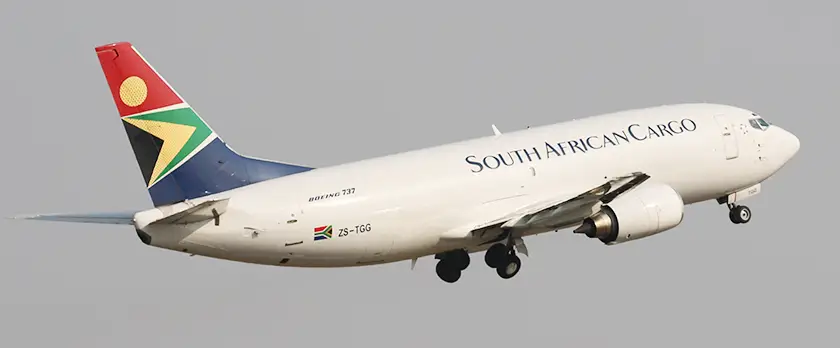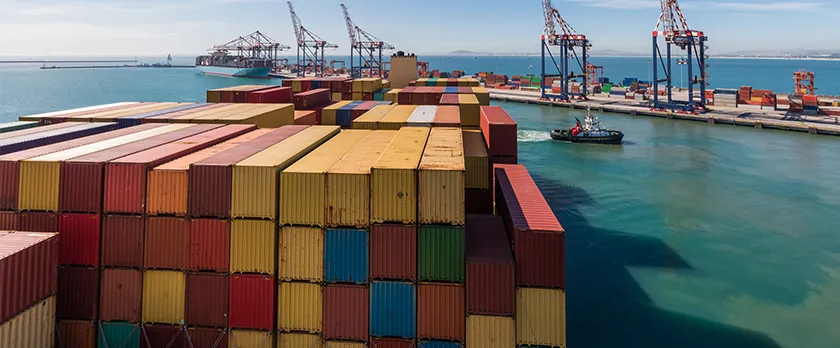UK/South Africa Shipping Rates 2025
Situated at the southern tip of Africa, South Africa serves as a gateway to both African and international markets. Its strategic location allows for efficient shipping routes to the UK, facilitating smooth and timely delivery of goods. South Africa boasts well-developed ports, such as Durban, Cape Town and Johannesburg. Here at DFS Worldwide our team are on hand to ensure a smooth and hassle-free import service for your cargo. Our all-encompassing services simplify the process, saving you time and effort.
UK ⇆ South AfricaGet a Shipping Quote
Air Freight

- Delivery of cargo can vary from 3 - 7 working days form Door to airport
- London Heathrow Airport - South Africa airports:
| Destination | 50 KG | 200 KG | 500 KG |
| Cape Town (CPT) | £140 | £250 | £410 |
| Durban (DUR) | £150 | £280 | £420 |
| East London (ELS) | £160 | £290 | £440 |
| Johannesburg (JNB) | £170 | £300 | £460 |
| Port Elizabeth (PLZ) | £160 | £290 | £440 |
* Documentation surcharge applies to any shipping to South Africa.
* For an accurate price, please use our online quotation form above and provide detailed information about your shipment requirement to South Africa.
Sea Freight

LCL – SOUTH AFRICA TO UK
| POL |
OCF W/M |
THC W/M |
DOCS | TT |
| Cape Town | $85 | £34 | £35 | 19 |
| Durban | $85 | £34 | £35 | 28 |
| Johannesburg | $144 | £49 | £40 | 31 |
- POD: Southampton or London
- Port to port service
- MIN 2 CBM
At DFS Worldwide, we understand that not all shipments require a full container. That's why we offer comprehensive Less than Container Load (LCL) services to accommodate your smaller shipments with the same level of care and efficiency as our full container services.
What is LCL Shipping?
LCL shipping is a cost-effective solution for businesses or individuals who don't have enough cargo to fill an entire container. With LCL, your goods share container space with other shipments headed to the same destination. This allows you to pay only for the space you need, making it an ideal option for smaller shipments.
Why Choose Our LCL Services?
1. We can offer door-to-door services from South Africa to the UK using a range of reliable carriers, many of which are based on direct services.
2. Rates can be obtained directly from the website for standard cargo meaning you have access to instant rates, alternatively you can speak to the sales team for the same competitive rates or anything outside of ‘standard’ cargo.
3. We offer regular, frequent sailings to Southampton or London ensuring your cargo is on a quick and efficient service.
4. We can arrange customs clearance on your behalf at the major seaports in the UK.
For Customers
Are you a small business owner looking to ship goods internationally? Or an individual relocating to a new country? Our LCL services are tailored to meet your unique shipping needs. With flexible scheduling options and personalized support, we make the shipping process hassle-free, allowing you to focus on what matters most – your business or your move.
For Freight Forwarding Partners
Looking for a reliable partner to handle your LCL shipments? Partner with us and gain access to our extensive network, cutting-edge technology, and dedicated support team. Whether you need assistance with consolidation, documentation, or transportation, we have the expertise and resources to streamline your LCL operations and help you deliver exceptional service to your clients.
Contact Us Today
Ready to experience the benefits of our LCL services? Get in touch with us today to learn more about our rates and how we can customize a shipping solution to meet your needs. Whether you’re shipping a small package or a large cargo, we’re here to help you navigate the complexities of international logistics with ease.
Rate terms:
- Based on 1 Cbm not exceeding 1000 s in weight.
- Subject to the final weight/dimensions and are based on commercial collection and delivery address with access/parking for an artic vehicle. Any special requirements such as tail lift, timed delivery etc will result in additional charges.
- Non palletised cargo will incur a fee of £ 15 per pallet.
- Based on general non haz, stackable cargo, unless stated otherwise and can only be used for standard pallet sizes.
- The exchange rate used is based on the current month and is subject to fluctuate.
- Subject to space, equipment, sailing and vessel availability.
- Subject to PSS and Emergency Contingency surcharges.
- Port to port inclusive of OCF, THC, Docs.
- Excluding: Any charges at origin, imports customs clearance, imports duties & taxes, any storage/detention, delivery.
FCL Container Rates
| South Africa | 20ft container | 40ft container |
| Cape town | £1280 | £1680 |
| Durban | £1000 | £1280 |
| Johannesburg | £1380 | £1670 |
| Port Elizabeth | £1180 | £1380 |
LCL Container Rates
LCL shipping from our London office in Feltham TW14 post code
| Total Volume* | Johannesburg |
| 1 CBM | £120 |
| 5 CBM | £350 |
| 10 CBM | £550 |
*Volumetric pricing
| Destination | 50 KG | 200 KG | 500 KG |
| Incheon | £190 | £285 | £615 |
Exporting to South Africa
Doing business in South Africa: South Africa trade and export guide1. South Africa export overview
South Africa is a sophisticated and promising market. It has a well developed economic infrastructure and opportunities in its emerging markets.
There are many UK investors in South Africa, including well known companies like Barclays, BAE Systems, BP, British Airways, Shell, Unilever, Virgin and Vodafone.
Strengths of the South African market include:
- large supply of natural resources
- well established and modern infrastructure
- well developed financial and legal services
- fast growing black middle class
2. Challenges doing business in South Africa
While South Africa is a well developed and promising market, there are some challenges when doing business there. These include:
- high unemployment
- poverty
- skills and capacity shortages
- infrastructure improvements needed for energy, transport and water
- high crime rate
- Broad-Based Black Economic Empowerment (B-BBEE) legislation
3. Growth potential
South African capital markets are top rated in the world, making it easy to raise financing. South Africa has a strong services sector. The government has set up an infrastructure upgrade programme to reduce infrastructure problems in energy, transport and water. The programme should help create short term employment and help enable the economy to grow in the longer term.
The top sectors include:
- finance
- real estate and business services
- general government services
- wholesale
- retail
- catering and accommodation
- manufacturing
The South African economy is forecast to grow at around 2% in 2015, up from 1.5% in 2014. This is expected to improve further in 2016 and 2017. However, there are still issues of unemployment, poverty and inequality.
South Africa is the most sophisticated and developed economy in Africa. South Africa is the ‘gateway to Africa’ for investors due to its:
- comparative sophistication
- ease of doing business
- continental expertise
- base for critical services for doing business in the rest of the continent
4. UK and South Africa trade
The UK is a valued trading partner for South Africa, with annual bilateral trade worth just under £10 billion. Department for International Trade (DIT) is focusing on high value and infrastructure opportunities, which are part of the South African government’s development plan.
Top UK exports to South Africa are:
- non-metallic mineral manufactures
- road vehicles
- beverages
- medicinal and pharmaceutical products
- petroleum and petroleum products
5. Start-up considerations
The business structures available in South Africa changed in 2011 when the New Companies Act was introduced. The structures available now are:
- private company
- sole proprietor
- public company
- partnership
- business trust
- non-profit organisation
The private company and sole proprietor are the most common and useful structures for creating a business. Close Corporations (CC) are no longer being registered, but CCs that existed before 2011 can continue to exist.
The choice between the various types of entity will depend on many factors, including:
- the complexity of the business arrangement
- if capital needs to be raised
- the type of enterprise
- if a joint venture is required with local partners
- the ability to meet the South African record keeping and auditing requirements
- the level of taxation for each type of enterprise
Trading names for companies must be registered with the Companies and Intellectual Property Commission (CIPC).
6. Legal considerations
South African business and legal systems are similar to those in the UK. Labour law is governed by many acts that provide a structure for businesses to operate in. You’ll need to be familiar with some labour acts before trading in South Africa. 7.1 Intellectual property (IP)
7. Tax and customs considerations
7.1 TaxIf a company is incorporated in or managed from South Africa, it’s considered to be South African for tax purposes. The question of residency needs to be addressed to avoid double taxation.
In South Africa, the central government levies most direct and indirect taxes. The tax regime is set by the National Treasury and managed by the South African Revenue Services (SARS). SARS collects revenue, ensures compliance with tax laws and regulates and controls customs. The provincial governments and local authorities also have limited taxing rights.
Value Added Tax (VAT) is the principal source of indirect taxation revenue in South Africa. It’s based on the same principles in the UK and there are certain exemptions for VAT.
A vendor must register for VAT if the taxable supplies for a 12 month period have, or are forecast to exceed R1 million per annum. A vendor may also voluntarily register for VATif the threshold of R50,000 has been exceeded in a 12 month period.
Other taxes include:
- stamp duty
- customs and excise duties
- transfer duty
- capital gains tax
- skills development levy
South Africa has a complex import process. SARS defines approximately 90,000 product tariff codes that are strictly enforced on all imports. You are encouraged to use a reputable customs clearance agent familiar with South African convention.
Customs South Africa (Customs SA), a division of SARS, requires that you register with its office to get an importer’s code. This can cause delays while clearing goods.
Import licenses are required for restricted items. You must have an import permit before the date of shipment. If you don’t, you may have to pay a penalty. 8.3 Documentation
SARS uses a Single Administrative Document (SAD) to allow clearance of goods. The SAD is a multi purpose declaration form covering imports, exports, cross border and transit movements.
8. Entry requirements
9.1 Work permitsIf you start a new business, or invest in an existing business in South Africa, you must apply for a business permit. Work permits will only be issued if South African citizens with the required skills are not available.

